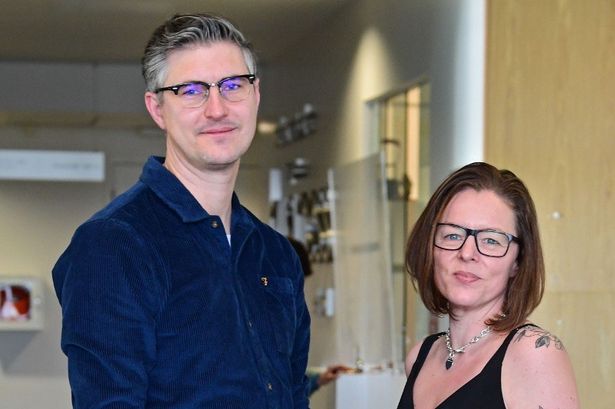A Merseyside man believes tattoo taboo in the workplace is becoming a thing of the past.
For some time, inked employees were viewed as having a "bad reputation" by society. They were often associated with negative career outcomes, stigmatised, and in some instances not even recruited in the first place. However, Professor Matthew Tucker, of Liverpool John Moore’s University, claims society's link between tattoos and unprofessionalism is now getting weaker and weaker.
The 41-year-old, from Formby, has 10 tattoos himself – the majority of which are visible when he wears shorts and a t-shirt.
READ MORE: Rapper left homeless after being 'bullied from workplace' over sexuality
He told the ECHO: “I have always wanted tattoos as an outlet to express myself and manage my mental health. I find the entire process extremely therapeutic and impactful. From the initial concept, design, actual tattooing and final results. I have always wanted tattoos from a young age but never committed, partly for financial reasons, and partly for confidence.
“I love tattoos that have meaning to me. It's an outlet to document my experiences and feelings and has allowed me to express myself about other issues, particularly mental health, which has been a constant battle for me, from a young age. Tattooing allows me to reflect on my experiences and I hope it can resonate with others who may feel the same.”
Prof Tucker’s favourite tattoo is one he got recently in honour of his dad-in-law who died of pancreatic cancer. The tattoo shows a bird set in front of a native Indian Lakota symbol with two mirroring triangles, depicting the interconnection between the physical and the spiritual worlds.
He added: “My father-in-law was a bird lover and avid pigeon racer, the bird is an ode to him and the Lakota symbol somehow makes me feel like he’s still here, and I’m still connected to him.”
Despite not being made to feel he has to, Prof Tucker chooses to cover his tattoos depending on the particular setting. He said this is “a personal decision” as he deals with external partners and students, both locally and abroad. Matthew said: “I’m always aware of how my tattoos may be perceived in particular cultural settings, and this does influence my decisions to cover up or expose them."
Wanting to know if he wasn’t alone in his feelings, the professor, alongside senior lecturer Gemma Dale, surveyed office workers about having tattoos. More than two-thirds of those interviewed claimed their tattoos were not an issue in the workplace and that in fact, employers made them feel accepted and comfortable about their ink. A similar proportion told researchers that employers no longer saw tattoos as relevant to job abilities.
The research team point to lockdown working, particularly the ‘zoom meeting’ as a watershed which has likely loosened some of the formality of how office teams interact. Prof Tucker added: “Attitudes are changing and employees are increasingly saying they are able to be themselves not some ‘standard’ office worker."
Around one in eight had identified working from home as a catalyst for change, citing choosing to dress differently, feeling more able to make their tattoos visible, being more likely to get a tattoo, feeling less judged about having a tattoo or being more able to express themselves through their tattoos.
However, while many were more comfortable sharing tattoos on some parts of their body, they still felt attitudes would be different if their ink was on their face or neck.
Moving forward, Gemma believes more organisations need to follow in the footsteps of Virgin Atlantic – which recently shifted its policy to encourage cabin crew to match their appearance to their personality to accentuate the human face of its business – as they are “many organisations that still outright ban tattoos, or require their employees to cover them up”, she claims.
The 45-year-old senior lecturer, from Allerton, has six tattoos altogether. She told the ECHO: “Most of my tattoos are just because I liked them. For me, tattoos are an art form. They are part of who I am. I do have a couple with a deeper meaning though. One is a song lyric that relates to my relationship with my husband and another relates to my mental health.”
Gemma’s favourite tattoo – a large design of flowers on butterflies on her back – was done over several years. Others, including one on her wrist, are more visible for others to see.
She said: “I have however had occasions in the workplace where people have seemed surprised when they have spotted them – I think I’m not the sort of person they expect to have a lot of ink. I do once recall a job interview where the interviewer kept looking at a small one on my wrist. I didn’t get the job but I did wonder if they had an issue with the tattoo but don’t know for certain. Tattoos have nothing to do with someone’s ability to do their job. That is what we should be focusing on – not what someone looks like or how they choose to present themselves.”
Receive our weekly LGBTQIA+ newsletter by signing up here.
READ NEXT:
- Brookside is returning to TV screens for the first time in 20 years
- 'I knew something 'wasn't right' when hospital called after routine test'
- Police close road after school bus and van crash
- Funeral for 'beautiful' Elle Edwards to be held today
- Lost Liverpool pub made famous in iconic 1980s television show

